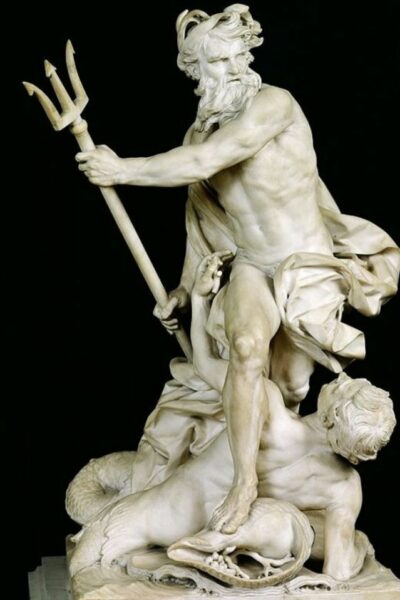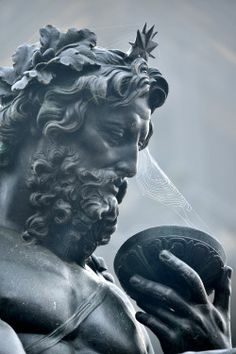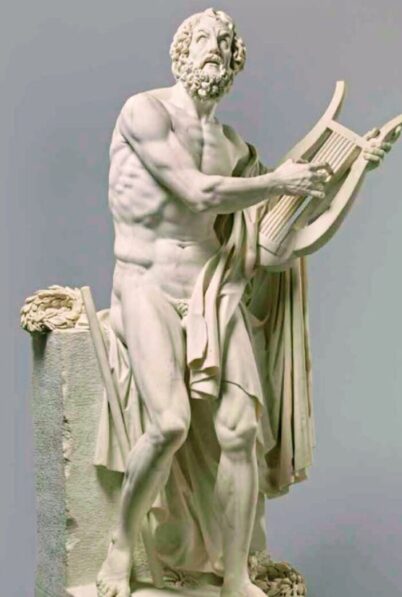Mythology & History
Mythology
Enipeas known since the Homeric years was a most handsome river god. It was one of the devotional monikers given to the god Poseidon and it means noisy. According to Greek mythology Enipeas was a handsome young man desired by all the Olympian goddesses. There is an ancient myth that tells the story of Tyro, the daughter of Salmoneas, king of Ilida. Tyro was often visiting the shores of Enipeas wailing over the water for her unreciprocated love for him. But Poseidon that was in love with Tyro seized the opportunity and took the form of Enipeas and seduced her right there at the river shores. Later on Poseidon revealed his true identity and foretold her about the birth of her twins. According to another myth it was at the Enipeas canyon where Orpheus was devoured by the Maenads, and it’s been also told that the gorgeous Lito, mother of the goddess Artemis and the god Apollo, used to bathe there. Local regentsup to these days picture Enipeas to be still washing his hair at the river shores. Moreover, Lucian, a well known orator and satiric writer of the 2nd century A.D dedicated one of his dialogs to the legendary Enipeas.
Homer’s Odyssey -l- ( Hades, Nekyia)
l 230 This was the plan that appeared to my mind as the best and the wisest :
l 231 Drawing the keen-edged sword at my sinewy thigh from the scabbard.
l 232 Many together to drink of the dark red blood I allowed not.
l 233 Each one after the other in order approached it, and singly
l 234 Each declared her descent ; and to all I addressed me with questions.
l 235 Tyro first I beheld, of a stock right noble descended
l 236 Daughter she boasted herself of Salmoneus, glorious hero
l 237 Wife, as she said, of a son begotten by Aeolus, Cretheus.
l 238 Once of a river enamoured, the heaven-descended Enipeus,
l 239 (He is the river the fairest by far on earth that is flowing)
l 240 Often she wandered along by Enipeus beautiful currents
l 241 Likened to whom did the Shaker of Earth, land-girding Poseidon,
l 242 Lay him adown by her side at the mouth of the eddying river.
l 243 Purple the wave stood round them, as solid and huge as a mountain.
l 244 Arching above and hiding the god and the earth-born woman.
l 245 Then did he, loosing the zone of the maid, shed slumber upon her.
l 246 Now so soon as Poseidon his amorous work had accomplished.
l 247 Tenderly clasping her hand he addressed her and greeted her kindly :
l 248 ” Woman, be glad in my love ! When the years revolution is ended l 249 Glorious children to bear will be thine for unfruitful is never
l 250 Couch of immortal. But see that thou carefully cherish and tend them.
l 251 Go to thy home, and be still, nor utter the name that I tell thee :
l 252 Lo, it is I that address thee, the King Earth-shaking Poseidon.”
l 253 These words uttered, he plunged in the depths of the billowing ocean.
History and healthy diet
The olive tree is an integrant symbol that we meet throughout history. A symbol of knowledge and wisdom represented by the goddess Athena, a victory trophy used at the coronations in the ancient Olympic Games, a symbol of peace and fertility,prosperity and health. Since the prehistoric era the olive oil is connected with a healthy diet, body nourishment and also adornment. During the ancient times it has been featured in all aspects of private and social life. We can’t help mentioning that during the ancient Olympic Games the athletes used to anoint themselves with oliveoil before their daily exercise, their practice and during the Games. That practice reinforced the muscle stimulation protected them from the cold and dehydration. The aryvallus filled with olive oil was the essential complement jar of the athletes. To remove the sand and dust from their oily bodies they used a strigil.



